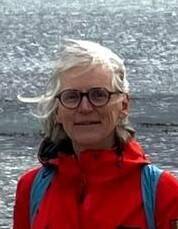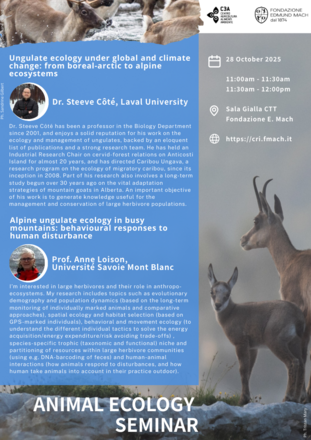Cos'è
Ungulate ecology under global and climate change: from boreal-arctic to alpine ecosystems
SPEAKER: Dr. Steve Côté, Laval University
Dr. Steeve Côté has been a professor in the Biology Department since 2001, and enjoys a solid reputation for his work on the ecology and management of ungulates, backed by an eloquent list of publications and a strong research team. He has held an Industrial Research Chair on cervid-forest relations on Anticosti Island for almost 20 years, and has directed Caribou Ungava, a research program on the ecology of migratory caribou, since its inception in 2008. Part of his research also involves a long-term study begun over 30 years ago on the vital adaptation strategies of mountain goats in Alberta. An important objective of his work is to generate knowledge useful for the management and conservation of large herbivore populations.
Academic background and professional experience:
Ph.D., Biology, Université de Sherbrooke, 1999
Post-doctoral fellow, Centre for Ecology & Hydrology and University of Aberdeen, 2000-2001
Assistant Professor in Animal Ecology, Université Laval, 2001-2005
Associate Professor in Animal Ecology, Université Laval, 2005-2009
Full Professor in Animal Ecology, Université Laval, 2009-present
and
Alpine ungulate ecology in busy mountains: behavioural responses to human disturbance
SPEAKER: Prof. Anne Loison, Université Savoie Mont Blanc
Anna Loison is interested in large herbivores and their role in anthropo-ecosystems. Her research includes topics such as evolutionary demography and population dynamics (based on the long-term monitoring of individually marked animals and comparative approaches), spatial ecology and habitat selection (based on GPS-marked individuals), behavioral and movement ecology (to understand the different individual tactics to solve the energy acquisition/energy expenditure/risk avoiding trade-offs) , species-specific trophic (taxonomic and functional) niche and partitioning of resources within large herbivore communities (using e.g. DNA-barcoding of feces) and human-animal interactions (how animals respond to disturbances, and how human take animals into account in their practice outdoor).




